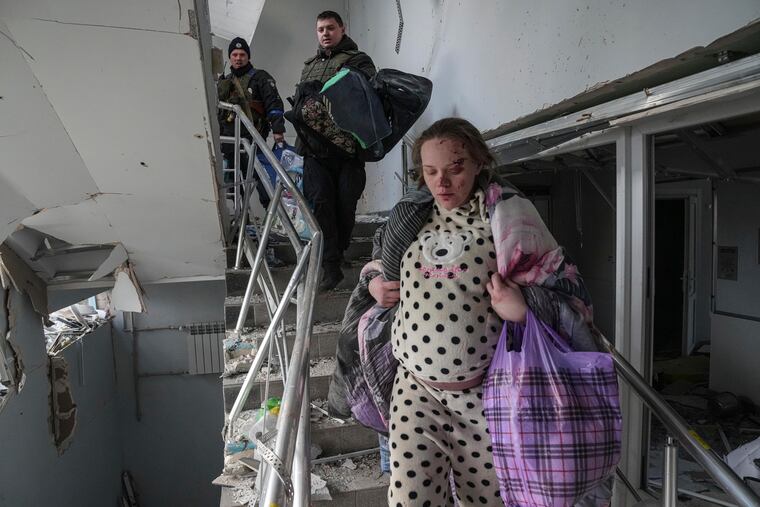‘We breathe for babies’: Video of fragile Ukrainian newborns makes the cost of war vivid for a Philly neonatologist
Those babies might begin to breathe on their own, as my own young patient had, only to live in a war-torn country, in a war-torn world.

As war erupted in Ukraine, I woke up to a video of Ukrainian neonatal intensive care unit (NICU) patients and health-care workers relocated to a bomb shelter. Those workers soothed some babies as others lay bundled on cots. A few babies were incapable of breathing without assistance. Lacking life-support machines, staff kept those babies alive using inflatable bags to deliver breath after breath after breath.
While the world was alive with war and protests, the streets awash with sorrow, I kept returning to this video.
I am a neonatologist, a doctor who cares for sick babies. I spend countless hours in NICUs, tending to babies like the babies in that video. My patients are babies born premature, babies with birth defects, babies who struggle to transition to life outside the womb, babies who cannot breathe without support.
As I watch and rewatch this clip, I fixate on the steady repetition of a health-care worker’s hand around the inflatable bag. I have done this, have made those same motions with my fingers, my wrist, my arm. I know the easy effort as the bag begins to deflate, filling a baby’s lungs with air. I know the subtle tension, the slight recoil in the bag, when those same lungs are full and my fingers relax so those lungs can empty, exhale. I know each baby has a unique pattern of pressure required for those bagged breaths to sustain life.
Health-care workers do this, squeeze and release and squeeze, when mechanical ventilators cannot meet a baby’s shifting needs. And when we move a baby from one part of a hospital to another, or from one hospital to another, or when we do not have ventilators at all. Apparently, we do this in war.
We also breathe for babies in labor rooms, where I, alongside my nursing colleagues, revive babies who do not take their first, most important breath. As those Ukrainian nurses kept squeezing, kept instilling breath after breath into their patients, my team and I ran to help a baby boy born flaccid, pale, and without breath.
As a nurse rubbed his back, another sucked scant fluid from his throat, and we prepared to breathe on his behalf. I placed a mask around his mouth, over his nose. Attached to that mask was a bag, like the bag the staff squeezed in that video, and I squeezed it again and again, simulating his absent inhalations. My eyes roved between the seconds counting the time elapsed since his birth and the motion of his chest. And then, without warning, he wailed. His arms wiggled; his legs kicked. His lower lip rolled out with vigor.
I wanted to feel relief, to believe his cries meant he could go on to live, breathe, thrive. But the previous week I understood, as I watched and rewatched health-care workers tend to those babies, that for them there was no reprieve. A few days later, I understood it again when I read about the bombing of a Ukrainian maternity hospital. Those babies’ lives depend on those workers continuing to work, apart from their own families, assisting their patients’ breaths in that shelter as war ravages the streets above them. Those babies might begin to breathe on their own, as my patient had, only to live in a war-torn country, in a war-torn world.
A world in which all of us, as babies, emerge unique but identical from our mothers’ bodies. Nearly all of us with two ears, pink tongues, 10 fingers, 10 toes. We draw breath, breathing and living together, until we do not. Globally, in 2020, as 3 million people died, breathless, from COVID-19, 2.4 million babies also died, breathless, and likely another 2 million babies were stillborn and never drew breath at all. The legions of birth attendants, midwives, nurses and doctors trained to help babies breathe simply do not have enough hands, enough bags, enough reach to find and sustain all of those breathless babies. And we cannot save the worlds’ children alone.
Neonatal mortality is highest in war-torn nations. These last few years, I’ve cared for babies whose families fled Afghanistan, Somalia, Iraq, and elsewhere. Babies whose parents came here, to Philadelphia, hoping their children might not only survive but also go on to live with the right to determine their own future. Newborn rights. Human rights.
Newborn babies’ vision is immature, cloudy. Babies cannot yet see what we adults see. A future of struggle or starvation, injustice or impunity. I used to feel assurance in the repetition, the squeezing, the assisted breathing that supports a baby’s respiratory cycle. This lifelong repetition that ceases only once. But that video taught me that this cycle is not synonymous with living, with family and freedom and flourishing.
Until we as global citizens and leaders alike recognize that those babies’ lives, wholly dependent on the selfless service of those Ukrainian health-care workers, are no different from our own lives and the lives of our soldiers, our coworkers, our families and friends, we cannot prosper. I wish every baby, everywhere, to breathe, to keep breathing. And then to grow to know a world where those breaths become a collective voice. A voice screaming for equity, for self-determination, for the world we want.
Rachel Fleishman is an attending neonatologist at Einstein Medical Center Philadelphia. She is also a writer whose essays may be found at www.rachelfleishman.com.